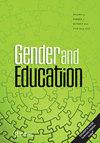‘It’s High School. Everybody gone judge yuh’: school as a social world where Afro-Caribbean girlhood experiences are created
IF 1.9
3区 教育学
Q2 EDUCATION & EDUCATIONAL RESEARCH
引用次数: 0
Abstract
ABSTRACT School operates as a space/place where girls must navigate and negotiate different aspects of their identities further adding to the complexities of Black girlhood. The scantiness of sociological scholarship surrounding Black girls from the Dutch West Indies elucidates this article’s importance. I conducted audio- and video-recorded interviews with nine Afro-Caribbean girls ages 14–17 years old. The interviews were interpreted using an Afro-Caribbean transnational feminist framework which specifically centres the lives of the girls. Findings reveal that Afro-Caribbean girls navigate school by negotiating their decisions about their hair, appearance, and dress to resist heteronormative ideas in Sint Maarten. This paper is a part of a larger project where I examined how Afro-Caribbean girls from the island of Sint Maarten conceptualise what it means to be a girl and to understand how they narrate, navigate, and negotiate their girlhood experiences.“这是高中。每个人都去评判你:学校是一个社会世界,在那里创造了非裔加勒比女孩的经历
学校作为一个空间/场所,女孩们必须驾驭和协商她们身份的不同方面,这进一步增加了黑人女孩时代的复杂性。关于荷属西印度群岛黑人女孩的社会学研究很少,这说明了本文的重要性。我对9名14-17岁的非裔加勒比女孩进行了录音和录像采访。这些访谈是用非洲-加勒比跨国女权主义框架来解释的,该框架特别以女孩的生活为中心。调查结果显示,在圣马丁岛,非裔加勒比女孩通过协商决定自己的发型、外表和着装,以抵制异性恋观念,从而在学校中表现得很好。这篇论文是一个更大项目的一部分,在这个项目中,我研究了来自圣马丁岛的非裔加勒比女孩如何概念化作为一个女孩的意义,并了解她们如何叙述、导航和谈判她们的少女时代经历。
本文章由计算机程序翻译,如有差异,请以英文原文为准。
求助全文
约1分钟内获得全文
求助全文
来源期刊

Gender and Education
EDUCATION & EDUCATIONAL RESEARCH-
CiteScore
5.20
自引率
9.10%
发文量
31
期刊介绍:
Gender and Education grew out of feminist politics and a social justice agenda and is committed to developing multi-disciplinary and critical discussions of gender and education. The journal is particularly interested in the place of gender in relation to other key differences and seeks to further feminist knowledge, philosophies, theory, action and debate. The Editors are actively committed to making the journal an interactive platform that includes global perspectives on education, gender and culture. Submissions to the journal should examine and theorize the interrelated experiences of gendered subjects including women, girls, men, boys, and gender-diverse individuals. Papers should consider how gender shapes and is shaped by other social, cultural, discursive, affective and material dimensions of difference. Gender and Education expects articles to engage in feminist debate, to draw upon a range of theoretical frameworks and to go beyond simple descriptions. Education is interpreted in a broad sense to cover both formal and informal aspects, including pre-school, primary, and secondary education; families and youth cultures inside and outside schools; adult, community, further and higher education; vocational education and training; media education; and parental education.
 求助内容:
求助内容: 应助结果提醒方式:
应助结果提醒方式:


